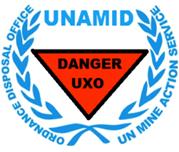
Impact:
Since 2005, ODO has conducted explosive hazard assessments and ordnance disposal tasks in 3,096 villages across Darfur. The tasks resulted in the closing of 1,326 reported dangerous areas, safe disposal of 55,542 explosive remnants of war (ERW) and the destruction of 3,378,061 small arms ammunition.
ODO provided risk education to 1,378,847 beneficiaries (including 296,071 men, 305,492 women, 450,286 boys and 377,178 girls), who are now able to adapt behaviour in at-risk environments. In addition, a total of 18,899 UNAMID personnel have received ERW safety awareness training (including police advisors, military observers, civilians and formed police unit personnel).
In 2003, armed conflict broke out between the Sudan Armed Forces and two armed rebel movements namely Justice and Equality movement and Sudan Liberation Movement. The conflict resulted in death of up to 300,000 people and the displacement of over 2.6 million people, majority of whom are still at the internally displaced persons (IDP) camp. UNMAS began operations in Darfur in 2005. In 2008, the programme became an integral component of the United Nations-African Union Mission in Darfur (UNAMID) designated as the Ordnance Disposal Office (ODO). In line with Security Council Resolution 1769 (2007) and further amendments, ODO is mandated to support Mission tasks including: protection of civilians, facilitation of humanitarian assistance and the safety and security of UNAMID and humanitarian personnel.
About:
In 2003, armed conflict broke out between the Sudan Armed Forces and two armed rebel movements namely Justice and Equality movement and Sudan Liberation Movement. The conflict resulted in death of up to 300,000 people and the displacement of over 2.6 million people, majority of whom are still at the internally displaced persons (IDP) camp. UNMAS began operations in Darfur in 2005. In 2008, the programme became an integral component of the United Nations-African Union Mission in Darfur (UNAMID) designated as the Ordnance Disposal Office (ODO). In line with Security Council Resolution 1769 (2007) and further amendments, ODO is mandated to support Mission tasks including: protection of civilians, facilitation of humanitarian assistance and the safety and security of UNAMID and humanitarian personnel.
Following a unilateral declaration of cessation of hostilities by the Government of Sudan and the main non-signatory armed movements in 2016, there has been considerable reduction in the level of conflict. This has allowed ODO access to areas that were hitherto inaccessible.
With the security situation improving, in 2018 the Security Council adopted resolution 2429 mandating UNAMID to focus its activities in Jebel Mara. Outside Jebel Marra UNAMID and UN Country Team should work hand-in-hand on priority areas deemed critical to avoid a relapse into conflict, with a view to facilitating transition of these portfolios to government, civil society and country team partners by June 2020.
Activities:
1. Explosive Ordnance Disposal (EOD):
In response to the ERW contamination, ODO deploys multi-task teams with a special focus towards the Jebel Mara location, areas where armed hostilities have occurred and communities hosting internally displaced persons.
2. ERW Risk Education:
Through risk education activities, communities are informed of the threat of ERW in their areas and how to stay safe. The ERW risk education aims at achieving behavioural change.
3. Capacity Building:
ODO provides technical support and capacity building to the National Mine Action Centre and to national implementing partners so as to enhance a sustainable national capacity.
4. Weapons and Ammunition Management (WAM):
ODO supports weapon and ammunition management initiatives with national security actors to help reduce the potential theft of small arms and ammunition and mitigate the risk of unplanned explosions at storage facilities. ODO also provides technical advice to UNAMID Military and Formed Police Units to support compliance with International Ammunition Technical Guidelines (IATG). As the mission draws down, ODO weapons and ammunition management effort is focused more on the verification of UNAMID team sites identified for closure and the safe disposal of contingent owned shelf-life expired ammunition. This is aimed at ensuring that the team sites are free of ERW and small arms ammunition before they are handed over to the Government of Sudan.
5. Victim Assistance:
ODO has supported assistance to survivors of ERW accidents through income-generation activities, the construction of vocational centers and training in vocational skills such as carpentry, welding, sewing etc.
Funding:
ODO activities are currently funded from the UNAMID budget. With the need for UNAMID to handover tasks to the United Nations Country Team, ODO in partnership with UNMAS Sudan programme are looking at mobilizing Voluntary Trust Fund contributions to fill in the gap created with the UNMAD drawdown from areas in Darfur.
For more information:
Gabriella Buescher, Programme Manager, Ordnance Disposal Office, Darfur, GabriellaB@unops.org
Paul Heslop, Chief of Programme, UNMAS New York, heslop@un.org
